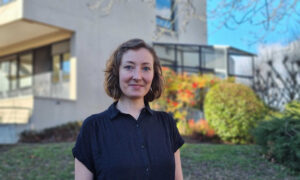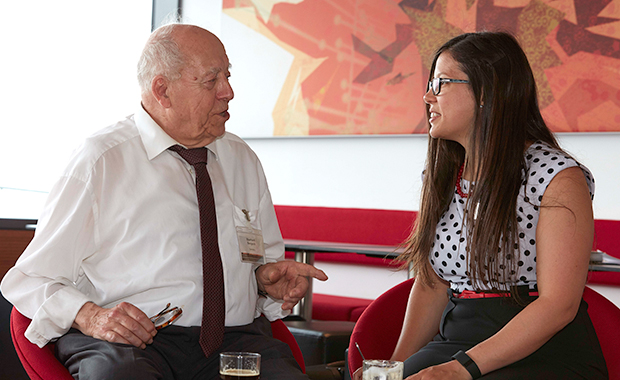
Read the latest Issue
Conference attendee Eberhard Bengsch explains why EMBL’s events programme has him coming back time and again

The EMBL Advanced Training Centre could easily be mistaken for Eberhard Bengsch’s second home. Bengsch is a serial conference participant, attending eight different events in the past two years alone – with more firmly marked in his diary. Bengsch is a natural fit for the international and interdisciplinary events taking place at EMBL. His career has taken him from Germany to Belgium, to the United Kingdom, to the Netherlands, before finally settling in France. Now retired, Bengsch continues to build and share his expertise in fields spanning chemistry, physics, virology, and more. Julie Heinecke spoke to him at a recent conference…
My main area of interest is tumour medicine – be it in the chemical, biological or medical fields. I have worked for many organisations, including the French Patent Institute, as a visiting scientist at various universities, as well as the Max Planck Institute departments of Virology and Protein Chemistry. Over the course of a 45-year career in research, I have accumulated a large amount of multi-facetted knowledge. Attending conferences enables me to share this expertise as well as to keep up to date with the latest developments.
There are so many benefits from bringing disparate research ideas together, and this underscores the importance of the conferences at EMBL
I came to EMBL for the first time in March 2015 to the Frontiers in Stem Cells and Cancer meeting. I had been tasked by a private foundation to draw up an evaluation report that brought together input on industrial medical science, clinical oncology, stem cells, cancer genetics and epigenetics. Conferences at EMBL are very focused and bring together the best researchers from all over the world. The size and formats of meetings provide a great platform for meeting others and to bring knowledge and ideas together. The choice of topics – particularly the EMBO|EMBL Symposia – is excellent, and the possibilities seem endless. In many cases I have been able to find answers to fundamental questions that I have long puzzled over. I always stay from the first lecture until the last, and evaluate everything critically. In doing so it is possible not only to learn how things should be done, but also how things should not be done.
Since the 1970s the number of people in research has increased significantly – and for those working on very specialised subjects it’s not always easy to know what researchers in other areas are working on. But there are so many benefits from bringing disparate research ideas together, and this underscores the importance of the conferences here at EMBL. Young researchers should dedicate time to learn about what others are doing, synthesise this knowledge and reflect on their thoughts: this is how the best science happens.
I don’t have much free time! I still carry out some research and also enjoy swimming, biking and beekeeping.
Looking for past print editions of EMBLetc.? Browse our archive, going back 20 years.
EMBLetc. archive